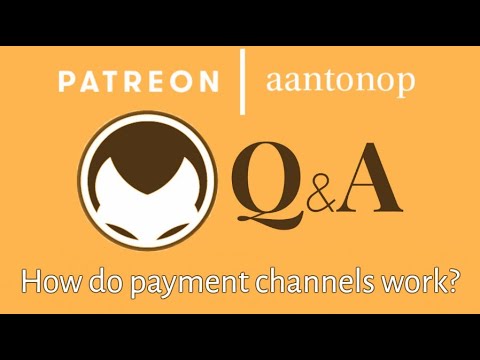Can you explain how Lightning Network and payment channels work? Will the channels have scaling problems? Can Lightning be interoperable without SegWit? Is Lightning also for altcoins? Interoperability standards. Who runs Lightning nodes? The bigger it gets, the less we know about how big it is.
NOTE: On December 27th, a Lightning developer wrote “How Lightning Currently Cannot Work Across Assets, or, An Argument For Single-Asset Lightning Network,” about the “significant technical barrier[s]” and incentive issues when using HTLCs for currency conversions, which is something I talked about in this video starting at 11:42. Read it for more perspective on this topic: https://lists.linuxfoundation.org/pipermail/lightning-dev/2018-December/001752.html
These questions are from the MOOC 10.5 and 10.6 sessions, which took place on October 5th and October 11th 2018, respectively. If you want early-access to talks and a chance to participate in the monthly live Q&As with Andreas, become a patron: https://www.patreon.com/aantonop
RELATED:
Bitcoin, Lightning, and Streaming Money – https://youtu.be/gF_ZQ_eijPs
The Internet of Money: Five Years Later – https://youtu.be/6xIq0FdmsIA
The Lightning Network – https://www.youtube.com/playlist?list=PLPQwGV1aLnTurL4wU_y3jOhBi9rrpsYyi
Advanced Bitcoin Scripting, Part 1: Transactions and Multisig – https://youtu.be/8FeAXjkmDcQ
Advanced Bitcoin Scripting, Part 2: SegWit, Consensus, and Trustware – https://youtu.be/pQbeBduVQ4I
The Lightning Network – https://youtu.be/vPnO9ExJ50A
Lightning’s security model – https://youtu.be/_GNsT_ufkec
Misconceptions about the Lightning Network – https://youtu.be/c4TjfaLgzj4
Eltoo, and the early days of Lightning – https://youtu.be/o6eFZ5aI9N0
Lightning Network scaling – https://youtu.be/4KiWkwo48k0
Lightning Network interoperability – https://youtu.be/1HYMWcJHGXc
Lightning Network game theory – https://youtu.be/7if0DuTtozY
Lightning fees and censorship resistance – https://youtu.be/DVF27my9V2w
Atomic swaps – https://youtu.be/fNFBA2UmUmg
Running nodes and payment channels – https://youtu.be/ndcfBfE_yoY
What is Segregated Witness (SegWit)? – https://youtu.be/dtOjjB4mD8k
SegWit and fork research – https://youtu.be/OorLoi01KEE
Smart contracts, sidechains, and Lightning – https://youtu.be/wfxticQHvaw
Sidechains and federated consensus – https://youtu.be/mHLgpX4VYBQ
Andreas M. Antonopoulos is a technologist and serial entrepreneur who has become one of the most well-known and respected figures in bitcoin.
Follow on Twitter: @aantonop https://twitter.com/aantonop
Website: https://antonopoulos.com/
He is the author of two books: “Mastering Bitcoin,” published by O’Reilly Media and considered the best technical guide to bitcoin; “The Internet of Money,” a book about why bitcoin matters.
Subscribe to the channel to learn more about Bitcoin & open blockchains; click on the red bell to enable notifications about new videos!
MASTERING BITCOIN, 2nd Edition: https://amzn.to/2xcdsY9
Translations of MASTERING BITCOIN: https://bitcoinbook.info/translations-of-mastering-bitcoin/
THE INTERNET OF MONEY, v1: https://amzn.to/2ykmXFs
THE INTERNET OF MONEY, v2: https://amzn.to/2IIG5BJ
Translations of THE INTERNET OF MONEY:
Spanish, ‘Internet del Dinero’ (v1) – https://amzn.to/2yoaTTq
French, ‘L’internet de l’argent’ (v1) – https://www.amazon.fr/Linternet-largent-Andreas-M-Antonopoulos/dp/2856083390
Russian, ‘Интернет денег’ (v1) – https://www.olbuss.ru/catalog/ekonomika-i-biznes/korporativnye-finansy-bankovskoe-delo/internet-deneg
Vietnamese, ‘Internet Của Tiền Tệ’ (v1) – https://alphabooks.vn/khi-tien-len-mang
MASTERING ETHEREUM (Q4): https://amzn.to/2xdxmlK
Music: “Unbounded” by Orfan (https://www.facebook.com/Orfan/)
Outro Graphics: Phneep (http://www.phneep.com/)
Outro Art: Rock Barcellos (http://www.rockincomics.com.br/)
source











Never liked lightning network. Until now. You opened my eyes 🙂
So how can I send a YouTuber a tip, or a waitress? This isn't practical. Not trying to be a jerk I'm just concerned
It's never going to work. Everyday people aren't going to get all this. Use stable coins to spend & BTC for savings. There's your killer dapp!
In case if you are reading this, I have a question. When a new balance transaction is created/exchanged, the users are supposed to exchange revocation keys which make sure no older balance transaction can be committed on-chain. What stops malicious party to not send their revocation key on the network level at the moment of exchange? I mean no network txs are atomic and parties send receive network packets few milliseconds apart, should be enough time to "drop" the connection in a hypothetical malicious client.
Let’s say a complex web of transactions happens on the lightning network. If one node in the web closes his channel or cheats, does that cascade to the rest of the channels in the web that he has transacted with indirectly? Or is the settlement localized?
So when the network scales, and these lightning nodes need to suddenly start settling large amounts of BTC and the fees become expensive again will the node owners loose money? How will they know what to charge users based on future fees? Some risk there?
Sir, great content but the video quality is not good.
i have always been quite pessimistic about LN but this time my mind clicked. I always thought that "locking" funds was just very bad I wouldn't want to do that. Now I realised that its actually the good thing. The fact that these "locked funds" can propagate is amazing and that's what clicked my mind to think that bitcoin might actually work.
AFAIK the LN capacity is now 500 BTC and it seems that a good UX is the only thing resisting adoption. Wallets are still migrating to segwit so it seems lighting support will take some time.
Andreas is the true legend, not me.
Great explanation!
Bitcoin is losing momentum. Fact is fewer people pay attention to bitcoin
How would this work in a retail setting where only 1 transaction is needed?
What if a payment channel is signed prematurely on accident?
6K views in 3 days, seems that bitcoin is nerdy again (=
Will the average user have to have a LN node?
It spuds like lightning network was originated at a bar after having too many drinks. It is like a lot of shit and not enough bull ?
Nicely put! What I could not find (yet) is the easy way Andreas mentions to set up a Lightning Node. I've been running a BTC core node for at least a year, that was straightforward. But the few tutorials I've seen on how to set up a Lightning Node were ultra-technical.
Lightning is an overlay network, NOT a sidechain. nice explanation. Lightning is essentially a smart contract settled onchain. Brilliant!
Fascinating!
can you do those kind of videos with some graphics, Andreas? That would be awesome!?
Keep it up!
You're one of the best guys in the Bitcoin-sphere!!! Thanks for your contribution!
Smashed the like
I probably will get downvoted for this, but the routing between LN channels actually is quite similar to the credit network in the Ripple Blockchain.